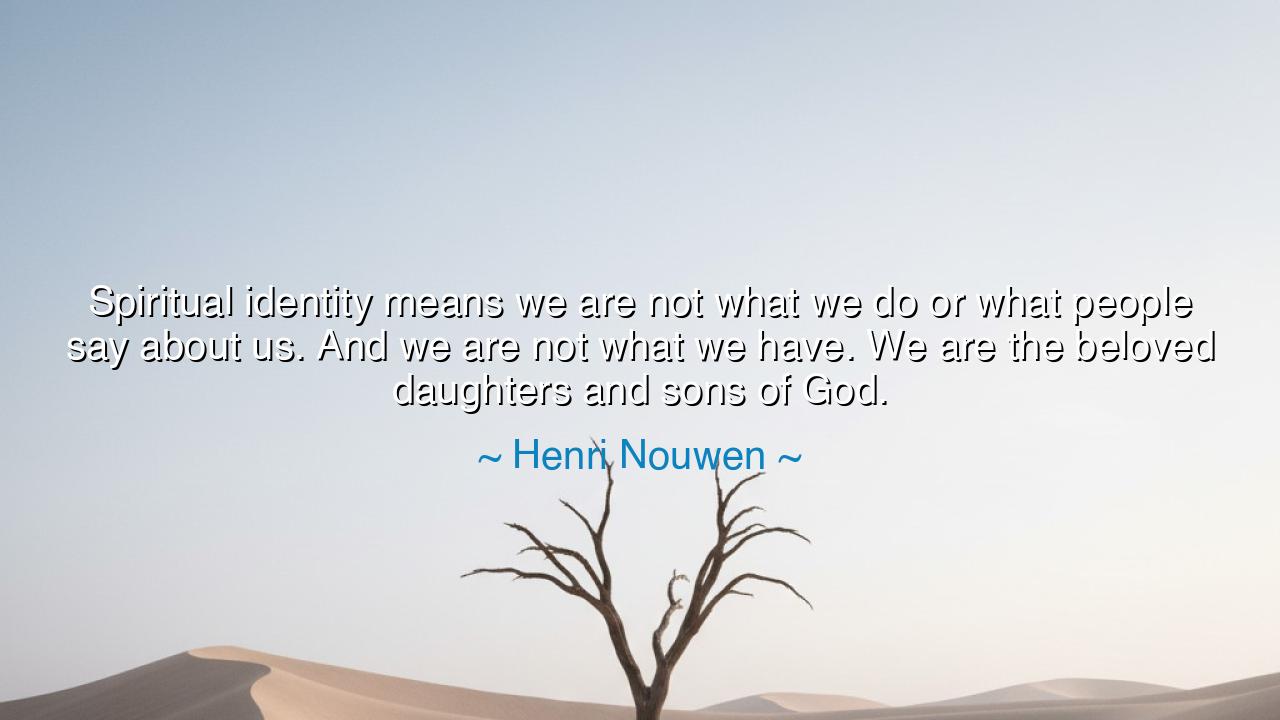
Spiritual identity means we are not what we do or what people say
Spiritual identity means we are not what we do or what people say about us. And we are not what we have. We are the beloved daughters and sons of God.






Hear the tender yet eternal wisdom of Henri Nouwen, the gentle teacher of the soul, who said: “Spiritual identity means we are not what we do or what people say about us. And we are not what we have. We are the beloved daughters and sons of God.” In these words lies the antidote to the sickness of the modern heart—the illusion that worth can be measured by achievement, possession, or reputation. Nouwen, a priest and scholar who walked among both princes and the broken, spoke this truth as one who had tasted both success and solitude. His words are a torch against the shadows of self-doubt and pride, calling humanity back to its divine origin, to that place of stillness where the soul remembers who it truly is.
The origin of this quote lies in Nouwen’s lifelong search for identity in the eyes of God rather than in the praise or rejection of men. A brilliant theologian, he taught at prestigious universities and wrote books that moved hearts around the world. Yet despite all his accomplishments, he wrestled with loneliness, insecurity, and a longing for belonging. It was not in fame but in humility that he found his answer. In his later years, he left the halls of academia to live in a community with the disabled—L’Arche Daybreak in Canada—where he discovered that those who could not speak or perform by the world’s standards radiated a peace he had never known. There, among those whom society deemed “less,” he learned the sacred truth: that human identity is not earned, but bestowed; not crafted, but received.
Nouwen’s words echo the ancient wisdom of the prophets and saints. From the beginning, mankind has sought to define itself by doing, having, and being seen. The warrior is known by his conquests, the scholar by his knowledge, the merchant by his gold. Yet all these vanish like mist before the wind of eternity. The soul that clings to them will never find rest. For when failure comes—as it surely will—the one who has built his worth upon the sands of achievement will find his house collapsing into dust. Only he who knows himself as beloved of God can stand unshaken when the storms of life arise.
Consider the story of Mother Teresa of Calcutta, who, like Nouwen, lived this truth. She was once asked how she could bear so much suffering, surrounded by the dying and the destitute. She answered, “I am a pencil in the hand of God, writing a love letter to the world.” She did not define herself by her deeds, though they were great beyond measure; she defined herself by belonging—as a child of the Divine, an instrument of His love. Even when criticized, misunderstood, or doubted, her peace remained, for her identity was rooted not in the voices of men, but in the unchanging heart of God.
This teaching is not easy for the modern soul, for we live in a world that demands proof of worth. From childhood we are told: Do more, have more, be more. We measure our days in titles, possessions, and the fleeting applause of others. Yet Nouwen’s words pierce this illusion. He reminds us that beneath all the noise, there is a voice—the voice of God—that whispers, “You are my beloved, on you my favor rests.” It is this truth that silences fear, heals shame, and frees the heart from the tyranny of comparison. When we remember we are beloved, we no longer need to compete for love, for we have already been chosen.
But to live in this spiritual identity requires courage. It means stepping away from the mirrors of public opinion and standing naked before God, trusting that His gaze is enough. It means releasing our hunger for recognition, our anxiety over success, our despair over failure. It means learning to rest, to be still, to let God’s love define us more deeply than any worldly label. For when we know who we are in His sight, we begin to see others the same way—not as rivals or strangers, but as fellow children of light, each bearing the same divine imprint.
Therefore, let this truth be your compass in the wilderness of self-doubt: You are not what you do. You are not what you have. You are not what others think of you. You are beloved. This identity cannot be taken, tarnished, or lost. It shines through failure and endures beyond death itself. When you awaken each morning, remember whose breath animates your being. When you labor, let it be from love, not for love. When you falter, return to that still center and hear again the eternal voice calling you by name.
And so, O child of the Divine, let Nouwen’s wisdom take root in your heart. In moments of triumph, remember humility; in moments of shame, remember grace. Seek not to be admired, but to be anchored. For when you know yourself as the beloved child of God, you have found the secret that frees all others—the secret that no possession, title, or praise can ever give: the peace of one who finally remembers who they truly are.






AAdministratorAdministrator
Welcome, honored guests. Please leave a comment, we will respond soon